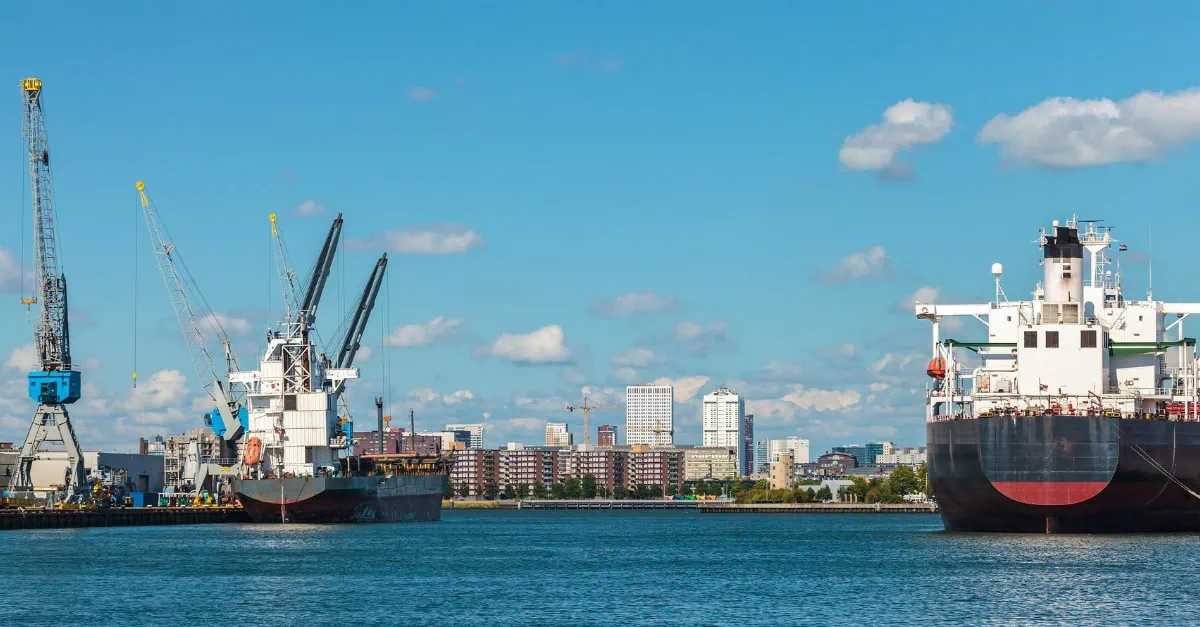Major European container ports Rotterdam and Antwerp are working through significant vessel backlogs following a series of strikes and protests that disrupted operations throughout October. The congestion is expected to take until the end of the month to clear, creating uncertainty for supply chains relying on these critical trade gateways.
Strike actions bring operations to near standstill
The disruptions began on October 5 when harbour pilots in Antwerp-Bruges initiated a work-to-rule protest, restricting vessel movements to office hours between 8:00 and 17:00. This immediately created a backlog as the port’s normal 24-hour operations were severely limited.
In Rotterdam, lashers responsible for securing containers began a 48-hour strike on October 8, which was quickly extended indefinitely after negotiations failed on October 10. Container-handling operations across all major terminals came to a near standstill, with the vessel backlog growing to roughly double normal levels.
The situation intensified when a national strike day on October 13 led to a complete suspension of all maritime traffic in Belgian ports until October 15. Congestion peaked with over 150 vessels waiting to enter or depart Belgian ports.
Current status and recovery timeline
Rotterdam’s strike officially ended on October 17 after lashers voted to accept a tentative agreement including a 17-20% wage increase over three years. The port resumed full operations, but around 30 container vessels are currently waiting to be handled, including 15 deepsea ships.
In Antwerp, harbour pilots temporarily suspended their action for a 10-day period starting October 15, allowing normal vessel scheduling to resume. As of this morning, 23 ships remain without a confirmed schedule and 15 vessels are experiencing delays. However, outgoing traffic is no longer affected, and Zeebrugge is operating normally.
Port officials in Rotterdam have indicated that clearing the accumulated backlog is expected to take until the end of October, with ripple effects likely to continue beyond that timeframe.
Capacity constraints and operational challenges
The Port of Rotterdam has reported that it currently lacks the ability to absorb excess traffic from Antwerp, leaving a substantial queue of ships waiting offshore. Some vessels are skipping Rotterdam entirely, creating additional uncertainty for exporters and putting pressure on alternative routes.
Earlier in October, activists from Geef Tegengas blocked the entrances of APM Terminals and Rotterdam World Gateway on the Tweede Maasvlakte. The protest, which targeted the port over alleged complicity in human rights violations in Gaza, added temporary pressure on top of the ongoing strikes. The blockade has since been cleared and normal operations at both terminals have resumed.
Implications for supply chains
The extended delays at two of Europe’s largest container ports are creating planning challenges for companies dependent on timely shipments. The uncertainty around vessel schedules and the potential for continued disruptions beyond October means procurement teams need to factor in additional lead times and consider alternative routing options.
German ports Hamburg and Bremerhaven are experiencing average delays of approximately 6 days and 2 days respectively, though these remain significantly lower than the backlogs at Rotterdam and Antwerp.
A deadline of October 24 remains in place for the Flemish Government to show progress on pension agreements with Antwerp harbour pilots, after which the action may resume.
This news snippet is part of Shypple’s full market analysis on “Rising rates after Golden Week, severe congestion in Antwerp & Rotterdam”. For the full market analysis, vsit: https://app.vespertool.com/market-analysis/2369
